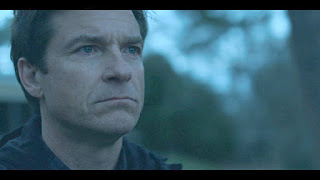As a weary, desperate husband and father in Netflix’s “Ozark,” Jason Bateman is terrific. He plays a mild Chicago money manager named Marty Byrde who launders cash for a Mexican drug cartel and wants to get out of it. Bateman is nicely restrained on the drama, giving us a man who controls his panic, a pot always just about to boil. In his precarious position, other men might be screaming and shooting and running away; instead, Marty contemplates and plots. You can feel the chill of his existential struggle, as he seems to constantly wonder if he’d be better off dead than taking on a cartel. On the one hand, he’s a sympathetic guy who has made bad choices, ultimately putting himself in the sights of the nasty cartel strongman, Del (Esai Morales). On the other hand, he’s charmless, very unlike Bateman’s best-known role as the endearing straight man in a pack of freaks on “Arrested Development.” Marty is a drab fellow whose best quality is his ability to lie his way out of disaster.
The last time a comic actor was so transformed by the right dramatic role, we were watching Bryan Cranston in “Breaking Bad.” And to some extent, “Ozark” works like “Breaking Bad” in reverse, as Marty tries to get out of the world of crime without meeting the fate of his business partner, who is liquefying in a big barrel of acid. Both White and Byrde are ordinary family men who face evil men with guns, devastating deceptions, and plans that never seem to go right. The two shows strike a similar tone, giving us remarkably specific characters and locations while nodding to larger themes about money, America’s failing systems, and masculinity. Source: www.bostonglobe.com
There are shocking moments that establish a constant tension throughout Ozark — this is horror, plain and simple — it’s Marty’s unbearable emotional arc that keeps us in his reality. From watching his wife’s sex tape, again and again, torturing himself in silence, to begging for his life at gunpoint after watching his friend and business partner die, to choosing whether or not his philandering wife — who just betrayed him, again, by trying to steal his money — will live or die, Marty’s ability to compartmentalize is astounding. What keeps it from being unbelievable, aside from Bateman, is his breakdown. This is a family story. This is a romance. This is unparalleled perseverance; brought on as a result of a bad decision, yes, but motivated by the purest of intentions. Marty loves his family. He lost them. And he’s not going to lose them again. Source: www.indiewire.com
When the camera panned away from Walter White’s cancer-struck, bullet-ridden body spread eagle on the floor of a Nazi meth lab, you could say it was a dark spirit of American ambition leaving its vessel. Consumed with his drive to financially provide for his family, Breaking Bad’s protagonist had descended into an amoral pit. He made a few attempts to pull himself out, but ultimately decided it wasn’t worth his efforts. He saw his American dream with tunnel vision, and irreversibly destroyed lives in his peripherals. Only his dream was compromised, having sacrificed too much – his family and humanity – to ever fully attain it. He had become a supremacist kingpin with no real home.
Ozark’s Marty Byrde (Jason Bateman) is chasing the American dream down a dark tunnel. In essence, Marty Byrde is an outsider. When his partner Bruce starts skimming off the top, Marty is forced to concoct a plan to pay the drug lords back. He invents a desperate scheme to move his entire operation to the Lake of the Ozarks in Missouri to cash in on tourism and property as well as the potential for distribution. Then we start to see the self-destructive urges churning beneath Byrde’s mannered exterior. The Byrde family: wife Wendy (Laura Linney), fifteen-year-old daughter Charlotte and thirteen-year-old son Jonah are immediately hit with culture shock. Lives uprooted to the Bible Belt, a wild country of hills, lakes, and dark woods, populated by townies, tourists, hillbillies, rednecks, and every type of lowlife.
Off the bat Marty and Wendy become entangled in the fabric of the Ozarks. A momma’s boy real estate agent who hires Wendy; Rachael, the mysterious and attractive owner of the Blue Cat Lodge; the preacher who gives his sermons on the lake; Buddy, the dying old man who lives in the basement of the house they buy; and the Langmores, the white trash low-level criminals are just a few of the characters into which the Byrdes crash their lives. How many deals with how many devils can Marty make? The local people who have lived in the Ozarks since before the Power Company flooded the area to build the lake do not forget. It’s something that Marty continues to overlook.
Early on when Marty and Ruth meet (Ruth robs Marty’s motel room while working as a maid) there is an instant connection between them. Without much explanation Ruth sees right through Marty when she says to him, “I do have this feeling, we both know, you’re better off dead.” Ruth sees Marty as her ticket out of the mud. Marty sees Ruth as his way into the Ozark community and as someone who is smart enough to keep up with him. Like in the Bible, Ruth will have to choose where she belongs. Jason Bateman takes his dry comedy style and turns it into a darker, more bitter interpretation. Jacob Snell pushes Marty down a path where it seems unlikely he can return. Walter White introduced us to a protagonist who slowly changed for the worst to provide for his family, but he struggled with his actions along the way. Marty Byrde, however, is riding quietly in an elevator going down, and we have no idea which button he is going to push next. Source: fishbowlsreview.com




















No comments :
Post a Comment